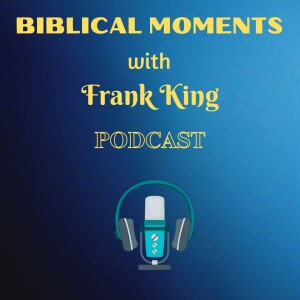Biblical Moments with Frank King
Word of God
Episodes

Monday Feb 24, 2025
Victory in Life Through the Word of God (Episode 129)
Monday Feb 24, 2025
Monday Feb 24, 2025
Many people who read the Bible don’t value it as they should. For some, it's because they don’t know how to properly use it for life. In this episode, Frank King teaches on how to experience victory in life through the Word.
In Paul’s letter to the Ephesians, he writes, “Put on the whole armor of God, that ye may be able to stand against the wiles of the devil” (Ephesians 6:11, KJV). The armor of God refers to the weaponry God gives us to fight with as opposed to physical armor.
The wiles Paul refers to in this verse refer to deceitful strategies. They lie at the heart of everything the devil does. He is a liar and a deceiver. But according to this verse, through the armor of God, we can endure and stand against the schemes of the devil.
Paul refers to the wiles of the devil because we are not wrestling against flesh and blood. Rather, our fight is with the rulers of darkness and spiritual wickedness in heavenly places (verse 12). We know how to fight against flesh and blood because we were born with that ability. We have perfected how to do that over the years.
The problem, however, is that our ability to fight against flesh and blood means nothing to the devil. He is our real enemy, and he is not flesh and blood. He often works through people to oppose us. But the real enemy are those demonic entities Paul mentions. They are the ones we must know how to successfully fight to experience victory in life.
The Sword of the Spirit
Though Paul addresses the whole armor of God, this episode focuses on one piece of the armor—the Word of God. Paul refers to God’s Word as the sword of the Spirit (verse 17). That makes it an offensive weapon.
The Greek word translated as “Word” in this case is "rhema" (hRAY-ma). This word does not refer to the Word of God in its entirety. Rather, it is the portion of God’s Word that we speak or apply at the right time for the situation at hand. We must learn how to use the Word of God as our sword against the enemy, if we want to have victory in life.
Many Christians understand the basic message of the Bible, but they don’t how to properly apply the Word to the situation at hand. This is a main reason they fail to experience victory in life against the enemy.
A good example of the principle of rhema at work is when the devil came against Jesus to tempt Him in the wilderness. This account is recorded in Matthew chapter 4. Notice that in each instance, Jesus knew the right scriptural thing to say to the devil at the right time. Jesus’ responses were preceded by words, “it is written.”
Jesus overcame the devil through the Word. After His third response to the devil, the devil retreated, and angels came and ministered to Jesus (Matthew 4:11).

Wednesday Jan 15, 2025
Increasing Your Capacity for the Word of God (Episode 123)
Wednesday Jan 15, 2025
Wednesday Jan 15, 2025
In this episode, Frank King teaches on how to increase your capacity for the Word of God. Every churchgoer has a certain capacity for understanding and receiving God’s Word. That capacity differs for each of us. Some churchgoers receive very little of what is preached from the pulpit. Some leave with a practical understanding of what God is saying through His Word. Most will fall somewhere in between.
This reality is not a reflection of one’s intelligence. Some churchgoers are greatly educated but have little capacity to receive the Word of God. Some with little education have a large capacity for the same. This is not about education. Rather, spiritual reasons exist as to why our capacity for the Word of God differs from person to person.
To explain why we differ in our capacity for the Word of God, Jesus taught a parable we refer to as the parable of the Seed and the Sower. In it, this farmer went about sowing seed in the ground. As he sowed seeds, they fell upon different places. Some went by the wayside, some fell upon stony places, some fell among the thorns, and some fell on good ground.
After Jesus had finished speaking the parable, the disciples came to Him wanting to know what it meant. Jesus explained the parable in terms of people who come to hear the Word of God. Each type of ground where the seeds fell represents a type of hearer. The interesting thing about this parable is that each of us falls into one of the categories of hearers in this parable.
Why Your Capacity for the Word of God Matters
This subject is important because you cannot live for God beyond your capacity for His Word. If you only have the capacity to receive the elementary teachings of the Word, then you can only live for God on an elementary level. But that’s not where God wants any of us to be. He wants us to have the capacity to receive the deeper teachings of His Word so we can live for Him on a deeper level.
The good news is that if you don’t like being where you currently are, you don’t have to stay there. You can increase your capacity for the Word of God. That is the focus of this episode.
Some churchgoers tend to blame the preacher for their lack of spiritual growth. Admittedly, preachers can have a negative impact on a person’s ability to hear God’s message. In other words, if we as preachers fail to make a clear presentation of the gospel, we can make it harder for people to understand and receive what God is saying so they can grow.
But that’s not the premise of the parable of the seed and the Sower. The premise of the parable is that the seeds that were sown were good seeds. We know that because when the seeds fell upon good ground, Jesus said they produced fruit.
The bottom line is that if your heart is good ground for the Word of God, it will produce fruit in your life. By contrast, if your heart is not good soil to be sown in, not even the best of preaching can render you fruitful.

Tuesday Nov 07, 2023
Prioritizing the Word of God (Episode 76)
Tuesday Nov 07, 2023
Tuesday Nov 07, 2023
How can you tell whether or not a local church and church leaders hold the Word of God in the highest regard? When local churches prioritize the Word of God, every other part of public worship is secondary to the ministry of the Word of God.
Jesus is our example. Everywhere He went, crowds followed Him. He preached and taught about heaven and everyday life. The people could take what He taught them and use it to grow in their relationship with God. In turn, they could make their homes and marriages better. It is vital for churches and church leaders today to believe that same power still exists in the ministry of the Word of God.
In the early days of the New Testament church, as it grew, there arose a need for church leaders to address the temporal needs of the widows. The apostles acknowledged the complaint to be legitimate. But they also knew it was not a work they should take on. They resolved to prioritize the Word of God. "It is not desirable for us to neglect the word of God in order to serve tables," they said (Acts 6:2, NASB). Church leaders today do well to follow the apostles' example to prioritize the Word of God.
Music Credits:
Intro Music: By Leva via Pixabay
Ending Music: By Oleksandr Savochka via Pixabay

Saturday May 20, 2023
Trusting the Word of God (Episode 56)
Saturday May 20, 2023
Saturday May 20, 2023
We can’t see God. We trust God by trusting His Word. The psalmist writes, “Your word is a lamp to my feet and a light to my path” (Psalm 119:105, NASB). Sometimes, what God says to us through His Word will defy all human logic. If everything He says to us must make sense to us before we act, we can’t effectively live the Christian life.
Sometimes, God challenges us to trust Him in areas where we think we don’t need His input. The church has too many people who choose to trust themselves and their own ability instead of trusting the Word of God. But the writer in the book of Proverbs warns us that what seems so right to us can turn out to be so wrong (Proverbs 14:12).
People say insanity is doing the same thing you did before but expecting different results. But what if the Lord asked you to do what you did unsuccessfully before, but to expect favorable results this time? That was the case with Peter and his fishing partners. After fishing all night and catching nothing, Jesus said to them, “Put out into the deep water and let down your nets for a catch” (Luke 5:4, NASB). Peter obeyed the Lord, and their boats began to sink. That’s what can happen when you trust the Word of God.
Music Credits:
Intro Music: By Leva via Pixabay
Ending Music: By Oleksandr Savochka via Pixabay

Saturday Dec 31, 2022
How the Word of God Changes Lives (Episode 38)
Saturday Dec 31, 2022
Saturday Dec 31, 2022
Jesus often used parables to teach the people. These were simple, picturesque stories with Kingdom applications. For example, He compared the ministry of the Word of God to a farmer sowing seeds. We know that a seed always produces after its own kind. In other words, if you plant corn, you get corn. Plant okra, you get okra, etc.
Things work the same way with the Word of God--it produces after its kind. That means, if you faithfully sow or minister the Word of God to those whose heart is open; over time, it will produce godly character in their life. In the parable, the sower is the farmer. For the ministry of the Word, the sower is the preacher, and his seed is the Word of God.
Jesus taught this parable of the seed and the sower to explain how God's Word changes lives. It's like a seed that is sown in the heart of men. At first it takes root on the inside. In due season, it produces godly fruit for all to see. It is vital for preachers to believe that the Word of God changes lives this way. If they don’t, they will resort to other means to impact lives, which will be ineffective.
Music Credits:
Intro Music: By Leva via Pixabay
Ending Music: By Oleksandr Savochka via Pixabay

Friday Aug 26, 2022
The Power of Preaching (Episode 20)
Friday Aug 26, 2022
Friday Aug 26, 2022
Most religious people know or have heard of the story of the Old Testament prophet Jonah in the belly of the big fish. Initially, Jonah did not want to preach to the people at Nineveh, as God had told him to. What ultimately happened is a reflection of the power of preaching. Accordingly, this episode focuses on how lives can be impacted by a word from the Lord—when those who hear it open their heart to God.
When Jonah finally went and preached to the people at Ninevah, they believed his preaching. They repented and covered themselves in sack cloth and ashes. When God saw how they repented and turned from their evil ways, He changed His mind, and did not destroy the city.
From what we can see in the Scriptures, Jonah’s sermon was only one verse long. He said, “Yet forty days, and Nineveh shall be overthrown” (Jonah 3:4, KJV). The power of his message was not in how long or how short it was. Rather, its power resided in whose message he proclaimed and in who was with him when he preached it.
Contrary to the thinking of many today, the power of preaching is not rooted in the length of one’s sermon or the communication skills of the minister. Neither in how loud or how energetic the message is delivered. But its power is rooted in whose message the preacher proclaims and in whether or not the preacher has been sent by God. Only by the latter can one’s preaching have power to impact and change lives.
Anyone who preaches the gospel should find much encouragement in Jonah’s preaching experience. Similarly, God has given us His Word to reach the lost. Through the preaching of the gospel, we can change the world, one life at a time. That’s if we dare to believe in the power of preaching.